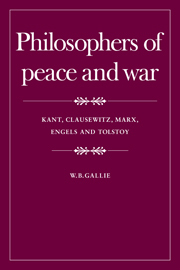Summary
Before the eighteenth century, such theorising as had been attempted in the field of international relations had been based on the simple picture of peace and war as a seemingly endless alternation or ding-dong between rival political powers. The only possible exceptions to this alternation were, it appeared, of two widely different kinds. There was the dream of a universal empire in which, following general conquest, permanent peace would be established throughout what men called ‘the known world’ and there was the nightmare of a world entirely given over to war, to war between peoples and within peoples, of a ‘time of troubles’ so pervasive that no part or aspect of human life would be left unharmed by it. During the eighteenth, and for the most part during the nineteenth century, the dream of universal empire was quiescent; the plurality of comparably powerful European states – and later the rise of new great extra-European powers – weighed heavily against it. At the same time the nightmare picture of a universal time of troubles seemed equally unrealistic: only a few prescient thinkers (Engels and Tolstoy among them) being driven to reconsider it in the last decades of the nineteenth century. For these reasons, most nineteenth-century thinking about international relations – despite the practical wisdom often shown by governments and the idealistic aims of many individuals, societies and congresses dedicated to the cause of peace – remained rooted in the traditional conception, the seemingly endless alternation of peace and war, whether this was taken as the starting-point for explanatory theory or as the target for curative action.
Despite their great differences, the thinkers whom we have been considering were at one in reacting against the above traditional assumption.
- Type
- Chapter
- Information
- Philosophers of Peace and WarKant, Clausewitz, Marx, Engles and Tolstoy, pp. 133 - 141Publisher: Cambridge University PressPrint publication year: 1978

